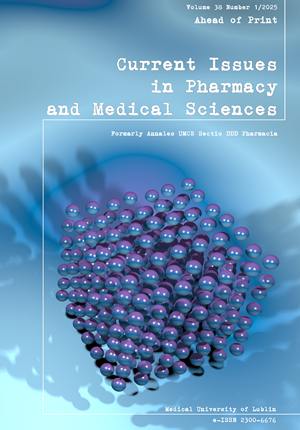A detailed analysis of Spirulina's therapeutic properties in liver protection, oxidative stress reduction, and cancer management
DOI:
https://doi.org/10.12923/cipms-2025-0004Słowa kluczowe:
hepatoprotective action, antioxidant, anticancer, phycocyanin, beta-caroteneAbstrakt
Spirulina, a cyanobacterium recognized for its nutritional benefits, has recently garnered attention for its potential therapeutic properties. This review aims to comprehensively consolidate current knowledge on the pharmacological attributes of Spirulina species, focusing on their hepatoprotective, antioxidant and anticancer effects. An exhaustive literature search was conducted, collating data from empirical studies, clinical trials and reviews pertaining to the pharmacological effects of Spirulina.
Spirulina exhibits significant hepatoprotective activities, evidenced by its ability to mitigate toxin-induced liver damage, primarily attributed to its rich antioxidant components (among others, phycocyanin, beta-carotene and tocopherol). These constituents counteract oxidative stress, making Spirulina a potent antioxidant agent. Additionally, numerous studies have pinpointed the anticancer potential of Spirulina. It impedes tumor growth and proliferation through various mechanisms, including the modulation of cell cycle, induction of apoptosis and inhibition of angiogenesis.
Spirulina offers a trifecta of pharmacological benefits: hepatoprotection, antioxidant activity and anticancer properties. These findings underscore the need for further research and clinical trials to validate the therapeutic applications of Spirulina in modern medicine.
Bibliografia
1. Shiri H, Yasbolaghi Sharahi J, Alizadeh Sani M, Mousavi SM, Nematollahi MH, Soleimani AA, Amri J, Panahi G. The Effect of Spirulina Supplementation on Blood Pressure in Adults: A GRADE‐Assessed Systematic Review and Meta‐Analysis of Randomized Clinical Trials. Phytother Res. 2025 ;39(1):397-412.
2. Al-Hussaniy Ha, Al-Tameemi Zs, Al-Zubaidi Ba, Oraibi Ai, Naji Fa, Kilani S. Pharmacological properties of spirulina species: hepatoprotective, antioxidant and anticancer effects. Farmacia. 2023;71(4):670-8.
3. Awad M, Al-hussaniy H, Alburghaif A, Tawfeeq K. The role of COVID-19 in myopathy: incidence, causes, treatment, and prevention. J Med Life. 2022;15(12):1458-63
4. Saraswathi K, Kavitha CN. Spirulina: Pharmacological activities and health benefits. J. Young Pharm. 2023;15(3):441-7.
5. Al-Hussainy HA, AL-Biati HA, Ali IS. The effect of nefopam hydrochloride on the liver, heart, and brain of rats: Acute toxicity and mechanisms of nefopam toxicity. J Pharm Negat Results. 2022;13(3):393-400.
6. Bondar A, Horodincu L, Solcan G, Solcan C. Use of Spirulina platensis and Curcuma longa as Nutraceuticals in Poultry. Agriculture. 2023;13(8):1-23.
7. Sonawane P, Bhosale M, Tambe T, Shinde S. Overall review on effective therapeutic benefits of Spirulina: A microalgae. Res J Pharmacogn Phytochem. 2022;14(3):214-8.
8. Shaaban SM, Gaber Z, Semary S, Dewidar AM. Impact of Vitamin B12 on outcome of Early Stage Luminal A and B Breast Cancer, single center experience. Med Pharm J. 2023;2(1):17-27.
9. Ammoo AM, Ali MH, Hameed TM, Al-Hussaniy HA, Aljumaili AA, Al-Fallooji MH, Kadhim AH. Antiepileptic Effect of Neuroaid® on Strychnine-Induced Convulsions in Mice. Pharmaceuticals (Basel, Switzerland). 2022;15(12):1468.
10. Seghiri R, Kharbach M, Essamri A. Functional composition, nutritional properties, and biological activities of moroccan spirulina microalga. J Food Qual. 2019;2019:3707219.
11. Mohamed NA, Hashem MA, Alzahrani AM, Abdel-Moneim AM, Abdou HM. Hepatoprotective effect of Spirulina platensis against carbon tetrachloride-induced liver injury in male rats. J Pharm Pharmacol. 2021;73(11):1562-70.
12. Kuhad A, Tirkey N, Pilkhwal S, Chopra K. Effect of Spirulina, a blue green algae, on gentamicin‐induced oxidative stress and renal dysfunction in rats. Fundam Clin Pharmacol. 2006;20(2):121-8.
13. Gargouri M, Hamed H, Akrouti A, Dauvergne X, Magné C, El Feki A. Effects of Spirulina platensis on lipid peroxidation, antioxidant defenses, and tissue damage in kidney of alloxan-induced diabetic rats. Appl Physiol Nutr Metab. 2018;43(4):345-54.
14. Al-Hussaniy HA, Altalebi RR, Tylor FM, Naj MA, Kadhim ZS, Aburghaif AH. Leptin Hormone: In Brief. Med Pharm J. 2022;1(1):1-3.
15. Li B, Gao MH, Zhang XC, Chu XM. Molecular immune mechanism of C‐phycocyanin from Spirulina platensis induces apoptosis in HeLa cells in vitro. Biotechnol Appl Bioc. 2006;43(3):155-64.
16. Mahmoud YI, Shehata AM, Fares NH, Mahmoud AA. Spirulina inhibits hepatocellular carcinoma through activating p53 and apoptosis and suppressing oxidative stress and angiogenesis. Life Sci. 2021;265:118827.
17. Liu R, Qin S, Li W. Phycocyanin: Anti-inflammatory effect and mechanism. Biomed Pharmacother. 2022;153:113362.
18. Taha MA, Moussa HR, Dessoky ES. The influence of Spirulina platensis on physiological characterization and mitigation of DNA damage in salt-stressed Phaseolus vulgaris L. plants. Egypt J Bot. 2023;63(2):607-20.
19. Mahmood AS, Reyadh AR, Shareef BQ, Albu-Rghaif AH, Al-hussaniy HA, Naji MA. Increasing Prevalence of Congenital Hypothyroidism in children with Down syndrome who have a family history of Thyroid disease. Res J Pharm Technol. 2023;16(3):1327-32.
20. Jiang W, Miao L, Lin Y, Ci L, Liu B, Ge X. Spirulina (Arthrospira) platensis as a protein source could improve growth, feed utilisation and digestion and physiological status in juvenile blunt snout bream (Megalobrama amblycephala). Aquac Res. 2022;22:100932.
21. Altalebi RR, Al-Hussaniy HA, Al-Tameemi ZS, Al-Zobaidy MA, Albu-Rghaif AH, Alkuraishy HM, Hedeab GM, Azam F, Al-Samydai AM, Naji MA. Non-alcoholic fatty liver disease: relation to juvenile obesity, lipid profile, and hepatic enzymes. J Med Life. 2023;16(1):42.
22. Araujo LC, Brito AF, Souza IL, Ferreira PB, Vasconcelos LH, Silva AS, Silva BA. Spirulina platensis supplementation coupled to strength exercise improves redox balance and reduces intestinal contractile reactivity in rat ileum. Mar. Drugs. 2020;18(2):89.
23. Aloke C, Egwu CO, Adelusi OA, Chinaka N, Kanu SC, Ogbodo PN, Akumadu BO, Achilonu I. Medicinal plants: A promising source of anti-diabetic agents in sub-Sahara Africa. Curr Issues Pharm Med Sci. 2023;36(2):65-76.
24. Haleem AM, Taha MM, Ayoub AA. Anti-tumor and anti-oxidant effects of Ganoderma lucidumextracts on oral squamous cell carcinoma and skin squamous cell carcinoma in vitro. Curr Issues Pharm Med Sci. 2024;37(2):79-84.
25. Al-Hussaniy HA, Аlmajidi YQ, Oraibi AI, Alkarawi AН. Nanoemulsions as medicinal components in insoluble medicines. Pharmacia. 2023; 70:537-47.
26. Al-Tameemi ZS, Hamad MN. Isolation of Three Secondary Metabolites from the Eucalyptus camaldulensis Dehnh. Plant for the First Time. Int J Drug Deliv Technol. 2022;12(1):55-62.
Pobrania
Opublikowane
Numer
Dział
Licencja
Prawa autorskie (c) 2025 Autorzy

Praca jest udostępniana na licencji Creative Commons Attribution-NonCommercial-NoDerivatives 3.0 Unported License.


